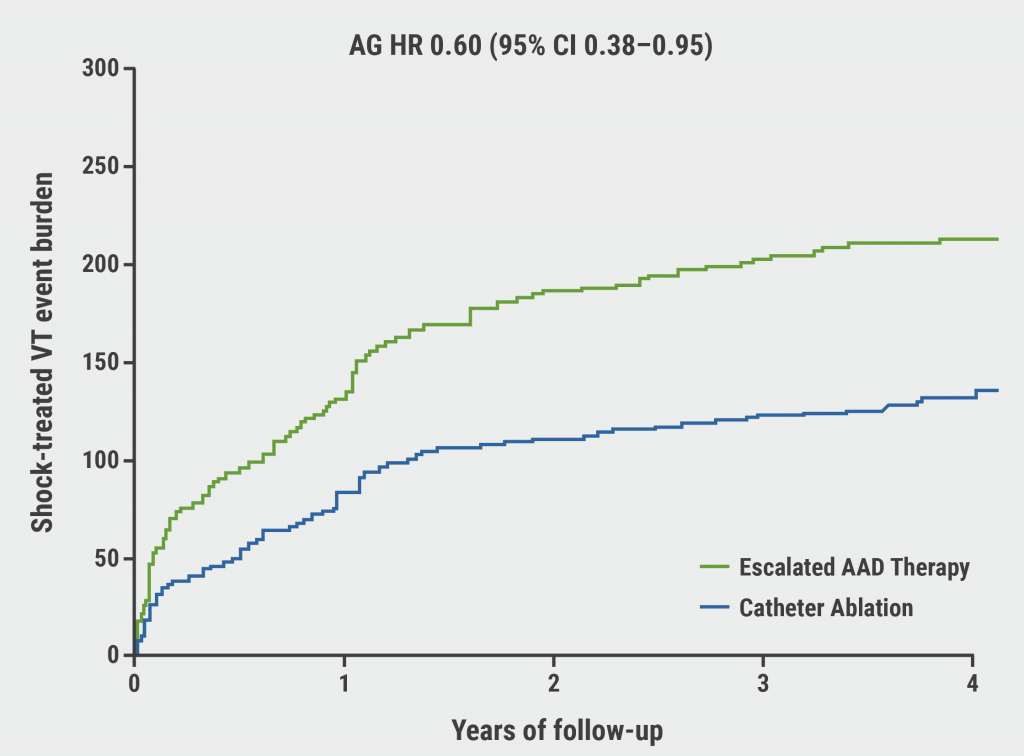https://doi.org/10.55788/dcf86941
Although the efficacy of CRT in patients with HF has been established in landmark trials, it has been suggested that the efficacy of CRT may be reduced in patients with HF and concomitant AF. This issue has not been thoroughly investigated, since patients with HF plus AF were limited in the conducted CRT trials. However, approximately 25% of the patients who receive CRT in the real world have AF. Dr Frederik Dalgaard (Herlev and Gentofte Hospital, Denmark) investigated the association between CRT and AF status in patients who were included in 5 landmark CRT trials (i.e. MIRACLE, MADIT-CRT, BLOCK-HF, RESERVE, and COMPANION) [1]. In total, 4,062 patients were analysed, of whom 661 had a history of paroxysmal AF. The clinical outcomes of this study were a combination of HF hospitalisation and all-cause mortality, and all-cause mortality alone.
After a median follow-up of 21 months, 837 patients had been hospitalised for HF, and 555 patients had deceased. The results showed that the ratio of hazard ratios between patients with and without AF was not significant (HR 1.24; P=0.16). Similarly, the secondary outcome of all-cause mortality did not display a significant interaction effect of CRT efficacy for those with and without AF (HR 1.34; P=0.19). Results did confirm that the overall population benefitted from CRT compared with no-CRT in terms of HF hospitalisation plus all-cause mortality (HR 0.74; 95% CI 0.62–0.87; P=0.005). The effect was smaller and non-significant in patients with concomitant AF (HR 0.87; P=0.37).
Including data from 5 landmark trials did not unambiguously confirm the efficacy of CRT in patients with HF and concomitant AF. Larger trials, focusing specifically on this sub-population of patients, are needed to address the efficacy of CRT in this group of patients.
- Dalgaard F, et al. Cardiac resynchronization therapy in patients with a history of atrial fibrillation: insights from five major clinical trials. CRT News, EHRA 2022, 3–5 April, Copenhagen, Denmark.
Copyright ©2022 Medicom Medical Publishers
Posted on
Previous Article
« RESET: No survival benefit of CRT-defibrillator over CRT-pacemaker in heart failure Next Article
Left bundle branch area pacing is a feasible technique for HF and bradyarrhythmia »
« RESET: No survival benefit of CRT-defibrillator over CRT-pacemaker in heart failure Next Article
Left bundle branch area pacing is a feasible technique for HF and bradyarrhythmia »
Table of Contents: EHRA 2022
Featured articles
Letter from the Editor
Diagnostics and Prevention
Cardiac magnetic resonance imaging improves prediction of post-MI sudden cardiac death
AI model accurately predicts sudden cardiac death in overall population
AI model accurately discriminates between arrhythmias
Impact of AF screening on stroke prevention influenced by systolic blood pressure
Developments in Devices
Conduction system pacing potential alternative for biventricular pacing in heart failure
Left bundle branch area pacing is a feasible technique for HF and bradyarrhythmia
Focus on the efficacy of cardiac resynchronisation therapy in HF plus concomitant AF
RESET: No survival benefit of CRT-defibrillator over CRT-pacemaker in heart failure
Insertable cardiac monitors effective for AF detection in cryptogenic stroke
Updates on Ablation
First results of the POWER FAST III trial
Real-world safety results on pulsed-field ablation with pentaspline catheter
VANISH: Ablation reduces shock burden compared with anti-arrhythmic drug in ventricular tachycardia
Low AF recurrence rates after PVI using pulsed-field ablation
Pulsed-field ablation reduces neurocardiac damage versus cryoballoon ablation
Ultrasound-guided femoral venipuncture reduces complications in catheter ablation
News on Atrial Fibrillation
Sex differences revealed in AF determinants and AF progression
Early rhythm-control therapy efficacious in men and women with AF
Progression in remote app-based monitoring of atrial fibrillation
Other Topics
Benefits of SGLT2 inhibitors may extend beyond HF-associated outcomes
© 2024 Medicom Medical Publishers. All rights reserved. Terms and Conditions | Privacy Policy
HEAD OFFICE
Laarderhoogtweg 25
1101 EB Amsterdam
The Netherlands
T: +31 85 4012 560
E: publishers@medicom-publishers.com


